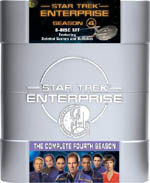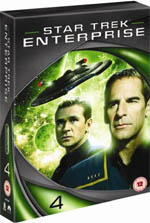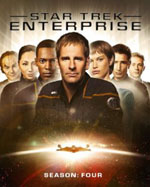77-78: Storm Front
"Star Trek: Enterprise" charged into its fourth season with a lot of momentum and with buoyed-up
hopes from its success with the previous season's long-term arc.... and promptly stumbled over its own
feet and came crashing down on its face. It was predictable really, considering the content of
the teaser for this story embedded into the last act of last season's finale
"Zero Hour". There
just isn't much draw for this show's tired, recycled take on time travel, or from Hollywood Nazi
stories. Only after crawling past this embarrassing two-part opener did the fourth season have
a chance to shine and prove to the world what was uniquely good and special about this incarnation
of Star Trek.
At least one aspect of this tale turns out to be far less awful than what "Zero Hour" had
led me to predict. The NX-01 and her crew have not found their way to an alternate primitive Earth of
2154 by way of a change in the past magically altering their present. My regular readers know
how vehemently I refuse to buy into such theories. Both Enterprise and Archer have been flung into
the past by Daniels - in the case of NX-01, probably with one of those barely noticeable sudden
cuts as the reunited crew approach Earth. As they go back in time, so they also slide over to the
alternate universe with a bizarre twist in its history. Okay fine.
But the writers, their three time-traveling instigators, and the regular "Enterprise" crew,
are all stuck thinking this adventure through from the concept of a single line of time constantly
being altered and re-written, and as this natural resource appears limited to them, so they all
find reason to fight and argue over it. It's all too small-minded and implausible for me to
entertain, let alone get invested in.
And getting invested in THIS particular narrative will be difficult for anyone no matter
what their temporal beliefs. It's hard to remember when last a Star Trek story has had such a
disjointed opening 20 minutes. Each scene appears to have little or nothing to do with the
scene before it, constantly shifting from one character to the next without making any of them
seem interesting in themselves or by way of what they are doing or by way of whom they are involved
with. Archer's role here is much closer to that of Sam Beckett in "Quantum Leap" than a main
protagonist of a Star Trek show, except as Sam he usually did a charming little fish-out-of-water
routine before quickly getting invested in some heart-warming aspect of what was going on, which
was usually made clear as he conversed with his holographic sidekick. In "Storm Front",
Bakula's character floats through scene after scene without finding a purpose, looking far more
clueless than he actually is. For the audience, this is really boring, and many may not stay
tuned in to see if he will eventually get a clue.
Another factor easily saps audience interest down to zero. On screen, we see history has
gone all "wrong". What does Star Trek do with this kind of situation? What has it always done?
Hit the reset-button of course, and pretend that the adventure never happened, and doesn't count.
Daniels even comes out and says that this is the outcome that the protagonists should hope and
strive for. It's going to be a tedious 2-TV-hour wait until they're done, after which the crew
can maybe get back to doing something important and real, with lasting impact.
Part One really misses the mark for me. The characters, their scenes, and their situation
just all seem to be too poorly chosen. Nothing that's going on interests me, and what I'm looking
at on screen hasn't got much appeal.
Part Two is a marked improvement, I'll give it that. In fact, for all that "Storm Front"
accomplishes narratively, you could do it with an edited down version comprised mostly of
material from part two. Instead of a 2.2 episode story beginning in the end of "Zero Hour",
it could easily have been an all-in-one-episode story, with a bit more zip and punch. Part two
definitely has better visuals and better story. Even then, this story is not really good enough
to be worth doing in the first place.
For its main villains, this story introduces a whole new set of time-traveling aliens.
I don't remember them being named on screen, but it'll be hard for any fans of
Sliders to not see them as Kromaggs, via both the lumpy grey
make-up, and the fact that they're all wearing Nazi uniforms. I often criticized Kromaggs when
later stories
used them as poorly disguised stand-ins for Nazi soldiers instead of aliens
with their own quirks and culture. But at least the Kromaggs were adept with the concept
of alternate universes. No one involved with "Storm Front" seems capable to think that far.
A lot of fans seem to want to hail new executive head writer Manny Coto as the saviour
of Star Trek: Enterprise, speculating that perhaps his influence came about a bit too late
to truly save the show. I've never been all that keen to jump on that bandwagon. Yes,
Coto did bring an improvement to the quality of that show, but I think it was a marginal
improvement, with a very hit-and-miss success rate, and "Storm Front" represents one of his
biggest misses - evidence that he was not THAT great a writer.
If he'd been truly brilliant, he'd have gotten out of this time-zone
in 5-10 minutes, before lavishing any production value on it,
and pursued a resolution of on-going arcs in Enterprise's normal present day, where
that resolution could count for something. For my money, the most positive influence on
Star Trek's writing this year easily comes from Judith and Garfield Reeves-Stevens,
who always seem to be heavily involved in the best portions of the season's best stories,
and not involved at all in its stinkers.
Curiously, the final portions of this story act as if they want to portray the final
chapter of the ongoing arc of the Temporal Cold War, and sign off on characters important
to that arc like Daniels and Sillick. But how can a definitive ending occur
in a history that gets re-written? This story shows Daniels dying for what must be at least the
second time on the show, and then goes on to show him alive and well and living happily ever
after in the coda. Death doesn't count when you can re-write time. So how can Sillick's
death count for anything? Does anyone actually believe that he either can't or won't come back
if the writers decide to do another story with him? If he and Archer had stayed in the
present, had an encounter, and he died, that might have been definitive. Here, with rewrites
fudging along over everything and anything, or to be more elegant, slides to alternate universes
occurring, who is to say another "double" version of him won't continue right on without missing a beat?
Besides, the only real open end on the temporal cold war that we hadn't had yet
would be to answer the mystery of who Sillick's mystery informant was, and what his situation
and ultimate motivation was. "Storm Front" doesn't go near to addressing any of that.
As far as tying up that arc goes, this story has been a pointless nothing.
Instead, we end with Daniels deep in his holographic representation of time rewriting,
going on about what a beautiful thing it is to see. Blech! I suppose the right hologram
could fool anyone into believing in something unreal. And he who is good with a hammer
tends to see every problem as a nail. "Time re-writes" have so become Daniels' "hammer"
that it seems he can't think in any other terms anymore.
I certainly wouldn't mind at all if this is the last
we see of Daniels. I'm hard pressed to find any story in which I liked what his presence
brought to the table.
As far as I am concerned, "Enterprise" fans can skip "Storm Front". It only got in the way
of the Earth-side payoff to season three's Xindi arc, coming up next episode....
Read the next In-depth Analysis Review:
"Home"
|
|








 slimline
slimline



